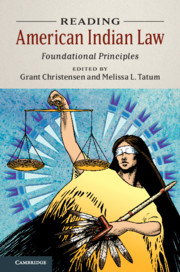Book contents
- Reading American Indian Law
- Reading American Indian Law
- Copyright page
- Dedication
- Contents
- Editors and Contributors
- Preface
- Acknowledgments
- Introduction
- Part I Core Concepts
- 1 Marshalling Past and Present: Colonialism, Constitutionalism, and Interpretation in Federal Indian Law
- 2 The Algebra of Federal Indian Law: The Hard Trail of Decolonizing and Americanizing the White Man’s Jurisprudence
- 3 Red: Racism and the American Indian
- 4 (Tribal) Sovereignty and Illiberalism
- Part II Voices
- Part III Property
- Part IV (Mis)Understandings
- Book part
- References
2 - The Algebra of Federal Indian Law: The Hard Trail of Decolonizing and Americanizing the White Man’s Jurisprudence
from Part I - Core Concepts
Published online by Cambridge University Press: 11 December 2019
- Reading American Indian Law
- Reading American Indian Law
- Copyright page
- Dedication
- Contents
- Editors and Contributors
- Preface
- Acknowledgments
- Introduction
- Part I Core Concepts
- 1 Marshalling Past and Present: Colonialism, Constitutionalism, and Interpretation in Federal Indian Law
- 2 The Algebra of Federal Indian Law: The Hard Trail of Decolonizing and Americanizing the White Man’s Jurisprudence
- 3 Red: Racism and the American Indian
- 4 (Tribal) Sovereignty and Illiberalism
- Part II Voices
- Part III Property
- Part IV (Mis)Understandings
- Book part
- References
Summary
The Algebra of Federal Indian Law: suggests that legal discourse inherited from a European perspective has helped to justify colonialism and perpetrate the ongoing subordination of Indian tribes. Because the common law was inherited from a system that treated non-Christian, non-White, indigenous peoples as inferior, judicial treatment of Indians can never reconcile competing worldviews. Instead, Williams argues for a rejection of European legal norms and the creation of an ‘Americanized’ approach to Indian law that reconsiders the origins of the power dynamic between Indian and European peoples to synthesize a new worldview.
- Type
- Chapter
- Information
- Reading American Indian LawFoundational Principles, pp. 47 - 71Publisher: Cambridge University PressPrint publication year: 2019

